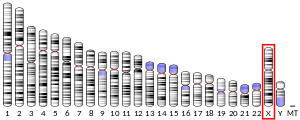Renin receptor
The renin receptor also known as ATPase H(+)-transporting lysosomal accessory protein 2, or the prorenin receptor, is a protein that in humans is encoded by the ATP6AP2 gene.[5][6][7]
Function
The renin receptor binds renin and prorenin. Binding of renin to this receptor induces the conversion of angiotensinogen to angiotensin I.[8]
This protein is associated with adenosine triphosphatases (ATPases). Proton-translocating ATPases have fundamental roles in energy conservation, secondary active transport, acidification of intracellular compartments, and cellular pH homeostasis. There are three classes of ATPases- F, P, and V. The vacuolar (V-type) ATPases have a transmembrane proton-conducting sector and an extramembrane catalytic sector. This protein has been found associated with the transmembrane sector of the V-type ATPases.[7]
References
- GRCh38: Ensembl release 89: ENSG00000182220 - Ensembl, May 2017
- GRCm38: Ensembl release 89: ENSMUSG00000031007 - Ensembl, May 2017
- "Human PubMed Reference:". National Center for Biotechnology Information, U.S. National Library of Medicine.
- "Mouse PubMed Reference:". National Center for Biotechnology Information, U.S. National Library of Medicine.
- Ludwig J, Kerscher S, Brandt U, Pfeiffer K, Getlawi F, Apps DK, Schagger H (Jun 1998). "Identification and characterization of a novel 9.2-kDa membrane sector-associated protein of vacuolar proton-ATPase from chromaffin granules". J Biol Chem. 273 (18): 10939–47. doi:10.1074/jbc.273.18.10939. PMID 9556572.
- Demirci FY, White NJ, Rigatti BW, Lewis KF, Gorin MB (Oct 2001). "Identification, genomic structure, and screening of the vacuolar proton-ATPase membrane sector-associated protein M8-9 gene within the COD1 critical region (Xp11.4)". Mol Vis. 7: 234–9. PMID 11590366.
- "Entrez Gene: ATP6AP2 ATPase, H+ transporting, lysosomal accessory protein 2".
- Nguyen G, Delarue F, Burcklé C, Bouzhir L, Giller T, Sraer JD (June 2002). "Pivotal role of the renin/prorenin receptor in angiotensin II production and cellular responses to renin". J. Clin. Invest. 109 (11): 1417–27. doi:10.1172/JCI14276. PMC 150992. PMID 12045255.
Further reading
- Kaneshiro Y, Ichihara A, Sakoda M, et al. (2007). "Slowly progressive, angiotensin II-independent glomerulosclerosis in human (pro)renin receptor-transgenic rats" (PDF). J. Am. Soc. Nephrol. 18 (6): 1789–95. doi:10.1681/ASN.2006091062. PMID 17494887.
- Schefe JH, Menk M, Reinemund J, et al. (2007). "A novel signal transduction cascade involving direct physical interaction of the renin/prorenin receptor with the transcription factor promyelocytic zinc finger protein". Circ. Res. 99 (12): 1355–66. doi:10.1161/01.RES.0000251700.00994.0d. PMID 17082479.
- Kaneshiro Y, Ichihara A, Takemitsu T, et al. (2006). "Increased expression of cyclooxygenase-2 in the renal cortex of human prorenin receptor gene-transgenic rats". Kidney Int. 70 (4): 641–6. doi:10.1038/sj.ki.5001627. PMID 16807542.
- Burcklé CA, Jan Danser AH, Müller DN, et al. (2006). "Elevated blood pressure and heart rate in human renin receptor transgenic rats". Hypertension. 47 (3): 552–6. doi:10.1161/01.HYP.0000199912.47657.04. PMID 16401765.
- Huang Y, Wongamorntham S, Kasting J, et al. (2006). "Renin increases mesangial cell transforming growth factor-beta1 and matrix proteins through receptor-mediated, angiotensin II-independent mechanisms". Kidney Int. 69 (1): 105–13. doi:10.1038/sj.ki.5000011. PMID 16374430.
- Otsuki T, Ota T, Nishikawa T, et al. (2007). "Signal sequence and keyword trap in silico for selection of full-length human cDNAs encoding secretion or membrane proteins from oligo-capped cDNA libraries". DNA Res. 12 (2): 117–26. doi:10.1093/dnares/12.2.117. PMID 16303743.
- Ramser J, Abidi FE, Burckle CA, et al. (2005). "A unique exonic splice enhancer mutation in a family with X-linked mental retardation and epilepsy points to a novel role of the renin receptor". Hum. Mol. Genet. 14 (8): 1019–27. doi:10.1093/hmg/ddi094. PMID 15746149.
- Gerhard DS, Wagner L, Feingold EA, et al. (2004). "The status, quality, and expansion of the NIH full-length cDNA project: the Mammalian Gene Collection (MGC)". Genome Res. 14 (10B): 2121–7. doi:10.1101/gr.2596504. PMC 528928. PMID 15489334.
- Strausberg RL, Feingold EA, Grouse LH, et al. (2003). "Generation and initial analysis of more than 15,000 full-length human and mouse cDNA sequences". Proc. Natl. Acad. Sci. U.S.A. 99 (26): 16899–903. doi:10.1073/pnas.242603899. PMC 139241. PMID 12477932.
- Hedera P, Alvarado D, Beydoun A, Fink JK (2002). "Novel mental retardation-epilepsy syndrome linked to Xp21.1-p11.4". Ann. Neurol. 51 (1): 45–50. doi:10.1002/ana.10051. hdl:2027.42/34887. PMID 11782983.
- Hu RM, Han ZG, Song HD, et al. (2000). "Gene expression profiling in the human hypothalamus-pituitary-adrenal axis and full-length cDNA cloning". Proc. Natl. Acad. Sci. U.S.A. 97 (17): 9543–8. doi:10.1073/pnas.160270997. PMC 16901. PMID 10931946.
External links
- ATP6AP2 human gene location in the UCSC Genome Browser.
- ATP6AP2 human gene details in the UCSC Genome Browser.





